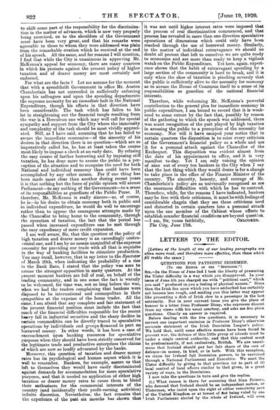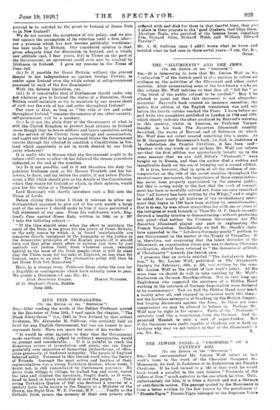LETTERS TO THE EDITOR.
[Letters of the length of one of our leading paragraphs are often more read, and therefore more effective, than these which fill treble the space.]
QUESTIONS FOR PATRIOTIC IRISHMEN.
(To THE EDITOR OF THE " SPECTATOR."]
Sta,--In the Times of June 2nd I took the liberty-of presenting the Ulster difficulty in a way which you disapproved. In your issue of June 5th you charged me with " political cant," which you said " produced in you a feeling of physical nausea." Since then the Irish Sea upon which you have embarked has certainly not become less rough, and sending you this' letter may appear like presenting a dish of Irish stew to a passenger in the last extremity. But in your current issue you give the place of honour to a letter from Professor Dicey, who expresses dissent from my views with his usual courtesy, and asks me five plain questions. Clearly an answer is required.
Before dealing with the fivo questions, it is necessary to correct one important omission in Professor Dicey's otherwise accurate statement of the Irish Dominion League's policy. We hold that, until some effective means have been found to prevent war, the defence of this little group of islands must be under a single central authority, and that this control must be predominantly, if not exclusively, British. We are unani- mous that Ireland should pay her fair share of the cost of defence—in money, in kind, or in both. With this exception, we claim for Ireland full Dominion powers, to be exercised through a National Parliament and Executive. We meet the Ulster difficulty by giving to that province (or to part of it) local control of local affairs similar to that given, in a great variety of ways, in the Dominions. I now take the questions in turn and give the replies.
(i.) What reason is there for assuming that Sinn Feiners, who demand that Ireland should be an independent nation, or Ulstermen, who insist upon the right of either remaining part of the United Kingdom or at lowest of not being ruled by one Irish Parliament elected by the whole of Ireland, will even. pretend to be satisfied by the grant to Ireland of Home Rule as in New Zealand?
We do not assume the acceptance of our policy, and we pro- test against the assumption of its rejection until a firm offer— not a promise which has now become politically worthless—
has been made by Britain. Our considered opinion is that, given adequate time for discussion in Ireland, and a wholly new attitude (not, I fear yours, Sir) to Ulster on the part of the Government, an agreement could even now be reached by Irishmen in Ireland. I gave my reasons in the Times of June 2nd.
(ii.) Is it possible for Great Britain, without the gravest danger to her independence as against foreign Powers, to confer upon Ireland even the whole extent of self-government Possessed by each of the five Dominions?
With the defence limitation, yes.
(iii.) Is it conceivable that if Parliament should under any Aot whatever give to Ireland the status of a Dominion, Great Britain could maintain or try to maintain by any means short of civil war the rule of law and order throughout Ireland?
Our view is that, as long as " the rule of law and order throughout Ireland " remains the concern of any other country, self-government will be a mockery.
(iv.) Is it not the plain duty of the Government of what is &till the United Kingdom to protect loyal citizens in Ireland (even though they be brave soldiers and brave constables acting in the service of the Crown) from outrage and assassination, and ought not this duty to be performed before the Government carries through the attempt to establish a Constitution in Ire- land which apparently is not in truth desired by any Irish party whatever?
It is really idle to discuss what the Government ought to do before—still more so after—it has followed the insane procedure indicated at the end of the question.
(v.) Is it not possible, and is it not therefore the duty for patriotic Irishmen such as Sir Horace Plunkett and his fol-
lowers, to draw, and lay before the public, if not before Parlia- ment, a Bill which should give us the details of the Constitution which they desire for Ireland or which, in their opinion, would give her the status of a Dominion?
Lord Monteagle will shortly introduce such a Bill into the House of Lords.
Before closing this letter I think it relevant to allow my distinguished opponent to give out of his own mouth a large part of the answer I should make to him if space permitted a full statement of our case. From his well-known work, Eng- land's Case against Home Rule, written in 1886, on p. 287 I take the following extract :-
" If the time should come when the effort to maintain the unity of the State is too great for the power of Great Britain, or the only means by which it is found maintainable are measures clearly repugnant to the humanity or the justice or the democratic principles of the English people—if it should turn out that after every effort to enforce just laws by just methods our justice itself, from whatever cause, remains hateful to the mass of the Irish people—then it will be clear that the Union must for the sake of England, no less than for Ireland. come to an end. The alternative policy will then be not Home Rule but Separation."
Here, by a strange irony Professor Dicey states the case for a Republic in contingencies which have actually come to pass. We prefer a Dominion.—I am, Sir, &c.,
Irish Dominion League, HORACE PLUNKETT. 13 St. Stephen's Green, Dublin.
June 15th.







































 Previous page
Previous page